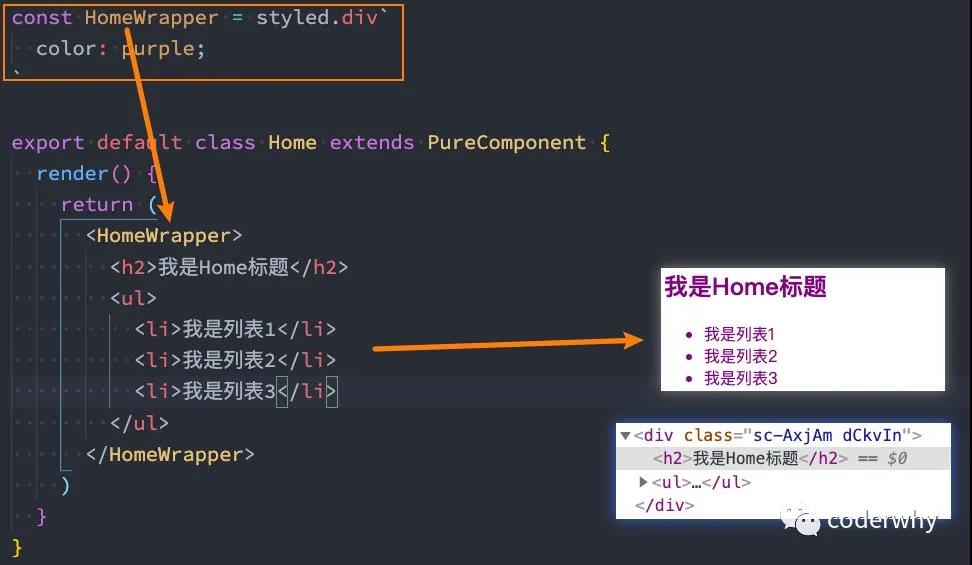coderwhy_React中的CSS
目录
相比Vue而言,React官方并没有给出在React中统一的样式风格。 以下介绍四种解决方案:
- 方案一:内联样式的写法;
- 方案二:普通的css写法;
- 方案三:css modules;
- 方案四:css in js(styled-components);
方案一:内联样式
render() {
return (
<div>
<h2 style={{color: this.state.titleColor, fontSize: "20px"}}>我是App标题</h2>
<p style={{color: "green", textDecoration: "underline"}}>我是一段文字描述</p>
</div>
)
}
内联样式的优点:
-
1.内联样式, 样式之间不会有冲突
-
2.可以动态获取当前state中的状态
内联样式的缺点:
-
1.写法上都需要使用驼峰标识
-
2.某些样式没有提示
-
3.大量的样式, 代码混乱
-
4.某些样式无法编写(比如伪类/伪元素)
方案二:普通css
render() {
return (
<div className="app">
<h2 className="title">我是App的标题</h2>
<p className="desc">我是App中的一段文字描述</p>
<Home/>
</div>
)
}
缺点:
- 组件化开发中我们总是希望组件是一个独立的模块,即便是样式也只是在自己内部生效,不会相互影响;
- 但是普通的css都属于全局的css,样式之间会相互影响;
方案三:css modules
.css/.less/.scss 等样式文件都修改成 .module.css/.module.less/.module.scss 等;之后就可以引用并且进行使用了;
使用方式:
 优点:
css modules确实解决了局部作用域的问题,也是很多人喜欢在React中使用的一种方案。
缺点:
优点:
css modules确实解决了局部作用域的问题,也是很多人喜欢在React中使用的一种方案。
缺点:
- 引用的类名,不能使用连接符(.home-title),在JavaScript中是不识别的;
- 所有的className都必须使用
{style.className}的形式来编写; - 不方便动态来修改某些样式,依然需要使用内联样式的方式;
方案四:CSS in JS
所以,目前可以说CSS-in-JS是React编写CSS最为受欢迎的一种解决方案; 目前比较流行的CSS-in-JS的库有哪些呢?
- styled-components
- emotion
- glamorous
目前可以说styled-components依然是社区最流行的CSS-in-JS库。
classnames
这是一个用于动态添加classnames的一个库。
classNames('foo', 'bar'); // => 'foo bar'
classNames('foo', { bar: true }); // => 'foo bar'
classNames({ 'foo-bar': true }); // => 'foo-bar'
classNames({ 'foo-bar': false }); // => ''
classNames({ foo: true }, { bar: true }); // => 'foo bar'
classNames({ foo: true, bar: true }); // => 'foo bar'
// lots of arguments of various types
classNames('foo', { bar: true, duck: false }, 'baz', { quux: true }); // => 'foo bar baz quux'
// other falsy values are just ignored
classNames(null, false, 'bar', undefined, 0, 1, { baz: null }, ''); // => 'bar 1'